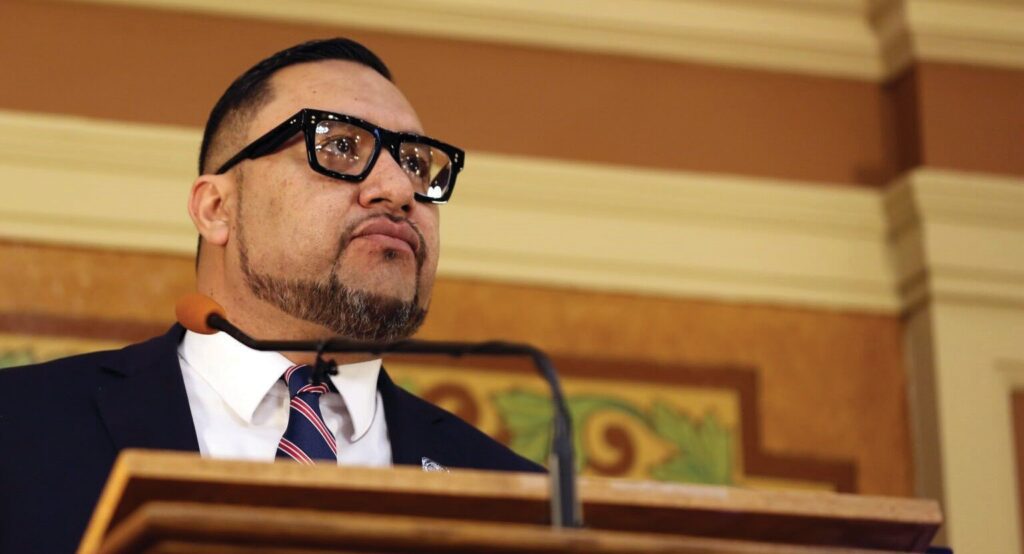Tribes hope to ‘reset’ state relations after Noem leaves office

J. Garrett Renville, chairman of the Sisseton Wahpeton Oyate, delivers the State of the Tribes address on Jan. 15, 2025, to legislators at the South Dakota Capitol in Pierre. (Joshua Haiar/South Dakota Searchlight)
Tribal leaders are ready for a new South Dakota governor.
Sisseton Wahpeton Oyate Chairman J. Garrett Renville delivered the annual State of the Tribes address Wednesday to lawmakers at the Capitol in Pierre. He encouraged state leaders to mend tribal relationships through collaboration and communication.
Republican Gov. Kristi Noem has a strained relationship with South Dakota tribes. Leaders from all nine tribal nations voted to ban her from their land last year after she suggested some of them are benefiting from the presence of drug cartels in the state, and said Native American children “don’t have any hope” or “parents who show up,” and pushed for tax cut legislation without seeking tribal input on its potential consequences.
Those statements and actions within the last few years “eroded the bonds leaders worked so hard to build,” Renville said.
“Today, let’s reset. Today, let’s rebuild. Today, let’s start to listen and actually hear,” Renville told lawmakers.

Standing Rock Sioux Tribe Chair Janet Alkire delivers the Tribal-State Relationship address during a joint session of the North Dakota Legislature on Jan. 7, 2024. (Michael Achterling/North Dakota Monitor)
Noem is expected to resign sometime after President-elect Donald Trump’s inauguration on Monday, if the U.S. Senate confirms her as Trump’s secretary of Homeland Security. Her confirmation hearing is set for 9 a.m. Eastern time on Friday in Washington, D.C.
If she’s confirmed, Lt. Gov. Larry Rhoden will serve the remaining two years of her gubernatorial term.
Standing Rock Chairwoman Janet Alkire said she agreed with Renville after his speech. She gave a similar speech to the North Dakota Legislature last week, stressing unity and collaboration. Standing Rock’s reservation includes land in South Dakota and North Dakota.
Alkire has worked with Rhoden during the Noem administration, saying he seems open-minded and “wanting to work” with the tribes.
“It gives you faith that maybe Rhoden will take a different approach,” Alkire said.
Rhoden introduced Renville ahead of Wednesday’s speech, calling him a “sound-minded leader” who cares for the people, health and safety of tribal nations. The two spoke earlier this week about mending state-tribal relations.
“I look forward to hearing how we, as state officials, can work together to govern our state,” Rhoden said.
Renville encouraged lawmakers to talk with tribal leaders as they draft and debate bills, and he promoted a series of ways South Dakota officials can work to improve quality of life for tribal members, including:
Supporting a permanent Bureau of Indian Affairs tribal law enforcement academy in South Dakota, to address what Renville described as a law enforcement “coverage gap.”
Passing a bill requiring the state Department of Revenue to report online sales tax collections from tribal areas in the state.
Passing a resolution urging Congress to exempt land sold to tribes from capital gains taxes, which Renville said could enhance tribal economic development and self sufficiency through land acquisition and agricultural investments.
Moving the Office of Indian Education back under the state Department of Education, instead of under the State Department of Tribal Relations, where Noem placed it in 2019.
Supporting the development of an Indian Managed Care Entity to negotiate costs for health care services covered by the federal-state Medicaid program.
Passing a resolution asking Congress to update and reauthorize the Native American Housing and Self Determination Act of 1996, which critics have said is outdated, leading to overcrowded, unsafe housing in tribal communities.
Renville also called for a resolution urging Congress to eliminate language from the Dakota Removal Act of 1863 that exiled Dakota people from Minnesota. Though the law is no longer enforced, critics consider its language to be racist. South Dakota lawmakers rejected resolutions supporting its repeal twice in 2019 and 2020.
Renville said tribal leaders in South Dakota are opposed to carbon dioxide pipeline projects, citing property rights and concerns about environmental effects. He added that although he is not opposed to Noem’s education savings account proposal, he wants the state to work with tribes “to ensure all students are considered” if the program is implemented. The proposal would use $4 million in state funding to provide families up to $3,000 per student to help cover the costs of private school tuition, homeschooling or other forms of alternative instruction.
“We cannot afford to wait for someone else to lead,” Renville said. “The challenges we face, whether in health care, law enforcement, agriculture or education, are urgent. And the opportunities before us are great.”
MAKENZIE HUBER
Makenzie Huber is a lifelong South Dakotan who regularly reports on the intersection of politics and policy with health, education, social services and Indigenous affairs. Her work with South Dakota Searchlight earned her the title of South Dakota’s Outstanding Young Journalist in 2024, and she was a 2024 finalist for the national Livingston Awards.
The post Tribes hope to ‘reset’ state relations after Noem leaves office first appeared on Native Sun News Today.
Tags: Top News
